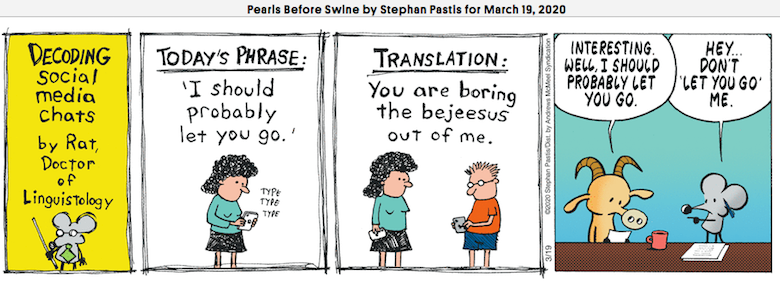I tend to be somewhat business-like in my conversations with people other than close friends and thus I often find myself in conversations with people, either face-to-face in the good old days or nowadays via phone or video or audio chats, in which the time has come when I want to end the conversation but find it awkward to do so without implying that I am tired of the other person’s company. Since we are now confined to home, the old standby of saying one has another engagement to get to is no longer credible.
Rat has decoded a common technique used to end calls.


Oops,something is boiling over on the stove!
Sorry, I need to go to the loo!
My falafel is on fire.
I have to go… water… my hair.
I just assert out of the blue, “welp, that’s enough conversation for one day” and end the call there. Sometimes I even say goodbye.
You think you’ve got it rough?
A friend and I have sleep issues (hers from being bipolar, mine from PCS). If we’re chatting on messsenger at 5am and I say “Sorry, I’m going to turn in,” she knows full well I’m not.
Is that an actual expression used in your part of the world? For me, “letting people go” immediately invoked associations with people being “let go” from their jobs, i.e. fired. That’s not a polite way to end a conversation at all.
My contribution to (phone-) conversation enders (untested): Any ominous and clichéd statement from horror movies among the lines of, “Hang on, I think I just heard a strange noise. I’ll call you back,” followed by not answering their calls for a month.
I find that interpretation interesting, but more so about the author, and those who can relate to doing so. When I say something along those lines (and I’m typically far more direct), I’ve often just sustained my maxima of enjoyable conversation. My brain needs some rest. About two hours of scintillating conversation is my limit, one hour of interesting, but limited utility or fascination. If someone is outright boring me, I’d just say, “I probably should be going, bye.” And I should be going because, I’m bored. Sometimes I’ll even directly ask, anything compelling or necessary to talk about? Before pulling an exit. It’s not that I’m bad at navigating social situations, it’s just I recognize the utility in being severe in a manner that puts no blame on the other person I’m interacting with.
I have heard that phrase before. Perhaps I’m particularly intolerable, but it usually occurs after about an hour when I’ve also satisfied any need for connection and am reaching my limit of it. Moderation, right?
I’ll be rather patient for anything that is less common than a monthly occurrence. Sometimes I find people presently experiencing pain to be rather boring (human pain is quite frequent, I’ve experienced enough that I rarely find discussion of it to grant further illumination, the exceptions being new interactions with people where it can help form bonds). If it’s the end of a long long-term relationship, I’ll suck it up a fairly massive amount, that’s basically a version of drug withdrawal. Similarly I’ll suck it up for someone going through an opiate or alcohol withdrawal, they could use my reassurance and distraction, and it’s relatively inexpensive for me (I’ve only experienced amphetamine withdrawal, which is less needy, I just had to sleep for about a week).
We all have our habits and decisions to make. I mostly tend to yammer on in text where no reply is expected. (e.g. the comments section of a moderately trafficked blog). It’s a reasonably polite thing to do when feeling a need for self-expression but not wanting to impose.
komarov @7, Yes, “I should probably let you go” is a polite expression in the US (along with the somewhat less polite “I should get going”). It doesn’t bring up an association with firing (in my mind at least), possibly because we have so many more contemporary euphemisms for job termination (lay off, right sizing, RIF, redeployment, offshoring, etc.)
komarov@7, Some Old Programmer@9:
Also, ‘I should let you go’ in this case has the vaguely passive-aggressive implication that the person saying it doesn’t necessarily want to go, but that the person being spoken to obviously has more important things to do. So it’s asking to end the conversation but putting the responsibility for it onto the other person at the same time, just so the person saying it doesn’t look like the one who wants to leave.
Personally, I don’t see a problem with just saying “It’s been great chatting but I have to go now”. You could even throw in a little humor: “Gotta go- things to see, people to do…strike that, reverse it.”
@ Lofty
My friend just died with a falafel in his hand.